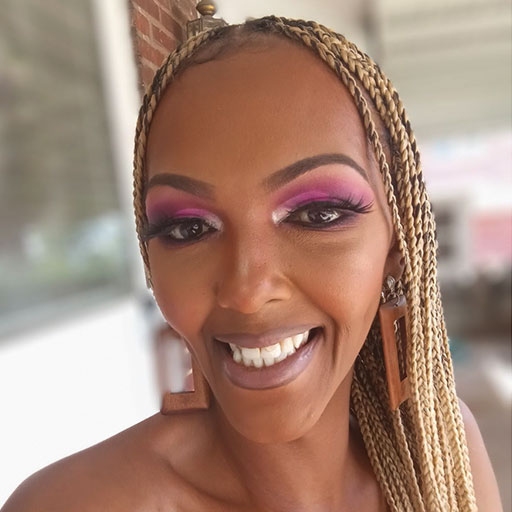Stigma, the shame that comes as a result of stigma, and fear often discourage people from revealing the extent of their health conditions and seeking help. For those living with HIV, the combination of these sentiments can be fatal.

When a situation like this happened to a close friend of Rhonda Carr, it inspired her to educate herself on HIV and use her knowledge to help others.
Now working as a Peer Navigator at The JACQUES Initiative in Baltimore, she hopes to destigmatize HIV and to support those living with it. She is also one of the faces of the #PeopleWhoLookLikeMe campaign, a Baltimore City Health Department initiative that encourages city residents to see the role they play in ending the HIV epidemic, and has worked as an advocate for transgender and non-binary people.
Read the interview below to learn about Carr’s passion for this work, and what she hopes to see in the future of Maryland health!
How did you get involved with The JACQUES Initiative and what do you enjoy about it?
“I’m from the LGBTQ community – I’m a post-op trans woman – and one of my friends passed away from the complications of HIV. The reason that he passed away was because he was ashamed to tell anyone what was going on and was scared to go get tested. I felt like he was my saving grace because I didn’t want anybody that I was close to, to feel like they didn’t have anyone to talk to if they were going through that. So, I got educated on what HIV was.
And as I started working here, the new medications started to come out. They introduced me to what undetectable means, so I can tell my community what undetectable means and how you can be undetectable. [I] also encourage people who are living with HIV to continue to take their medicine and let them know that this is not a death sentence. The best part of the job is actually being involved with the clients and the community. That’s one of the great things about being here.”
What has been the impact of the work you are doing with The JACQUES Initiative?
“I’ve met a lot of people who were afraid to tell people their status, [yet] disclosed to me what their status was. And I helped them get on treatment. One of the best things that happened is I found a newly diagnosed woman who really went through it when I gave her a diagnosis. With my help, she is now undetectable. Every time I see her in the community, she speaks and says I was her saving grace and that I was a blessing to her. That type of stuff makes me feel really good.”
What is one the biggest challenges that you face in your role?
“The biggest thing is getting people [on medication] that I think would need it because of their risk factors. Or even if I just know someone personally and they’re not taking advantage of things that can keep them from dealing with something that most people, or a lot of people, cannot deal with. The hardest thing for me is actually getting people to get on a medication that can help them stay negative if I know they’re doing a lot of different risky behaviors.”
What do you hope to see in the future of this field in Maryland?
“What I hope to see in the future is a cure for HIV. I know that there are some whispers in the air about it coming soon. But [I’d want] to get infection rates down to zero. I just want to see it disappear. Or I wouldn’t like it to be such a big thing for so many people being infected with this disease.”
What advice would you give to other peer navigators or other people who are working in this field?
“I know that things can be hard. I know that dealing with the community with a taboo topic is very hard and challenging at times. But I would say to each and every one of us: Continue to do the work. You matter. What you’re doing is a big thing in this world. And continue to do what you’re doing, regardless of if it may not seem that way. Because I know that even for me, times get hard. Days get hard. Work gets hard. But continue to push on. Don’t let the people that are over you stop your vision. Continue to be who you are.”
Rhonda Carr is a Community Outreach Worker for The JACQUES Initiative program for the University of Maryland.
She has worked in the HIV prevention field since 2012. In that time she has spoken to many different audiences ranging from the Baltimore City School System to various community members in Baltimore. Rhonda has also been a transgender advocate for her community, speaking and training staff at UMMC, UMB, and other agencies here in Baltimore, MD.
She has served on the board of multiple trans and non-binary studies to construct programs and resources for trans and non-ninary people to help better their lives. Rhonda has also headed multiple trans and non-binary workshops to offer a safe place where trans and non-binary people can discuss issues they face on a daily basis that are usually not expressed in daily life.
In closing, Rhonda’s life as a woman of trans experience has molded her into the woman you see today.
